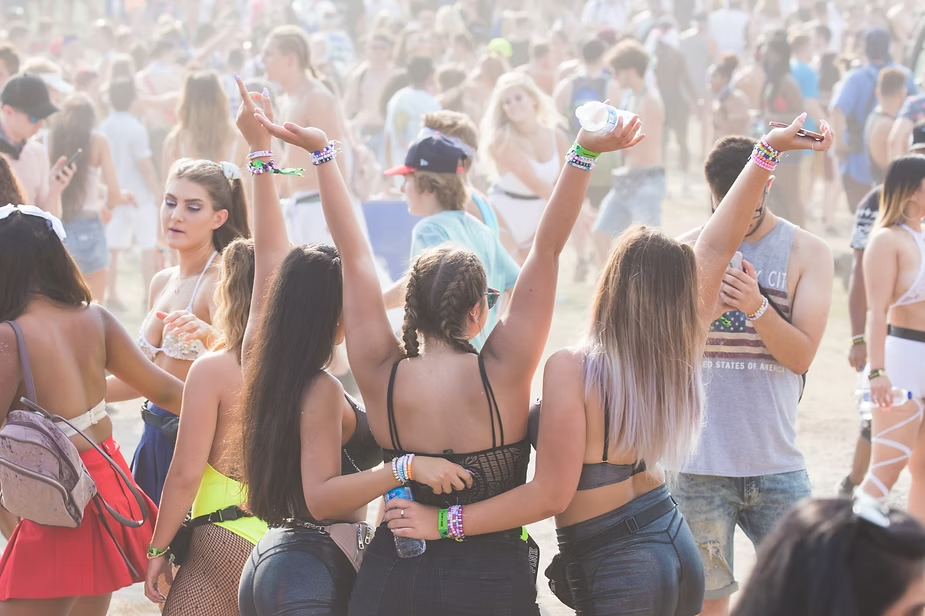It will come as no surprise to read that events are going to change. Following a year of a pandemic and an intermittent national lockdown we can all be forgiven as humans and communal beings, for wanting to see our friends, families, colleagues and indeed favourite musicians again. But as we look forward into the unprecedented – there’s that word again – post pandemic way of living, how can we ensure good practice and accept that as event organisers, we have a duty of care, a responsibility to lead the way as good role models, and an undoubtedly large population to protect?

We’ve been hearing in the last few days about festivals selling out at record speed, of performers refusing to perform at events where the vaccinated only rule has been suggested. If you’re a venue owner or event organiser chances are your inbox is once again starting to fill with hopeful enquiries. The world is picking up again and with so much to think about, if you’re feeling overwhelmed I hear you.
Here are some considerations as you start thinking about event planning for the “new normal” This list is everything that I have read and understood so far, is by no means exhaustive and as with any event you will want to tweak to tailor for each event’s unique set of circumstances.
1. Check your national guidelines and then check with your local authority and SAG.
It should be expected that guidelines will change over the coming year. I predict a lot of trial and error practices and potentially further restrictions if rules are not met. So it’s important that you remain vigilant and knowledgeable. Refer to HSE to stay updated and also check with the local authority of where the event is being held, as rules may differ between boroughs.
2. Ask for your local Director of Public Health to be involved in event discussions.
If Safety Advisory Group is involved in your event then the Director of Public Health will be. If not, you can ask them to be.
3. Make sure that your risk assessment includes considerations for Covid-19.
All event risk assessments will now be expected to have considerations for Covid-19 safety. It seems obvious that you’ll plan for this for the execution of your event but just be sure you have your new procedures included in your risk assessment also.
4. Be aware that your chosen venue may be subject to a capacity cap.
When sourcing your venue, be sure to speak with them directly about the capacity, as you might not be able to depend on any figures listed on their website. Expect to see capacity caps of 25 – 50%, depending on your requirements.
5. Your risk assessment needs to include the external environment. Travel to and from local facilities, for example.
Here you might want to consider Covid safety on public transport, advising your attendees of limited use of public amenities and think about crowds outside your venue, perhaps with staggered start and finish times.
6. Remember that social distancing applies to your entire event population, not just attendees.
Think about how you will monitor this with your staff, suppliers and performers.
7. Further mitigating actions need to be included in your risk assessment where the social distancing rule cannot be met.
In close proximity situations at your events, you’ll want a stricter protocol for hand washing, face coverings and regular disinfection of items being handled.
8. Face coverings are encouraged for the foreseeable future. You will need to be aware of the exceptions made for those who cannot wear them for health reasons.
Include this in your risk assessment and how you will remain inclusive in these measures to keep all of your attendees safe.
9. Hand washing facilities should be in abundance.
You will need to increase your hand washing and sanitation facilities, throughout your chosen venue and on the entrances and exits. Increase these further still where there are WC’s, where food is being handled and where the social distancing rule is compromised.
10. Signage for your event will need to be plentiful, with clear messages to highlight Covid safety measures both taken by the organisers, and to be adhered to by your attendees.
All feasible measures should be taken to ensure that your event population understand the rules of your event and the facilities available to them. Clear signage demonstrating the use of face coverings and directions to hand washing facilities.
11. PPE should be provided for your event staff. In most cases this will consist of a simple face covering. Full PPE should be reserved for staff handling food or providing medical services.
You will not be expected to have full PPE for your event staff, only those providing medical services or in some cases in the handling of food and drink.
12. A manager will need to be appointed for your event to monitor effective delivery of all of your Covid safety measures.
Consider employing a second pair of eyes for your event, specifically to monitor Covid safety. These protocols are new and you will want reassurance that you have someone to oversee these for you.
13. Event staff who can continue to work from home should, and a person should be appointed to monitor the mental health, inclusion and safety of those staff, and maintain good communication between them and on site staff.
This will be a new way of working for many event staff on your team and you’ll want to ensure that their needs are being met and that they still feel included and as valued as your on site staff.
14. All equipment needs to be routinely disinfected, particularly small equipment that is handled by a number of people.
15. Consider how your staff will travel to and from the event site. How will you ensure best practice here?
You might want to consider staggered start and finish times for your on site staff if it is feasible to do so.
16. Consider testing for staff, have measures in place to support staff who become unwell or display symptoms and need to self isolate.
17. Consider what you might need to provide for your clinically vulnerable staff.
18. Accidents, emergencies and evacuations will need further risk assessments and procedures for effective adherence to Covid safety.
As an example, think about how you will adhere to social distancing rules in the event of an evacuation. In an emergency your priority will be to evacuate all attendees quickly, so you might need to think about additional exit points.
19. Increase your cleaning protocol. Expect to increase your cleaning protocol to reflect Covid safety.
Make sure that your risk assessment clearly reflects your increased cleaning measures.
20. Toilet management. Increase your ratios and reduce crowding.
How will you manage cleaning, capacity and queueing? Extra signage will be required in these areas.
21. Communication and training.
Consider what additional training you will need to give your staff, so that everyone understands the new procedures and protocols they will need to adhere to.
22. GDPR and Test and Trace.
You must keep records of your event population for 21 days. After this period the data should be destroyed. This information needs to be available for Test and Trace when required. Ensure that those you are collecting data from are fully aware of how it will be used and stored, in accordance with GDPR law. If testing finds a positive result, you have a duty to inform your event population.
23. Community assurance.
It is important to communicate well with the local community where the event is taking place and keep them reassured of your protocols. These are new times for everyone, and it is to be expected that local communities may experience some anxiety around large gatherings. Involve them in your conversations and take note of their concerns, responding to them efficiently.
It is virtually impossible to predict how the future of events look right now, but being as prepared as we can be is the key to keeping everyone as safe as we can, and avoiding risk.
If you’re thinking of hosting events this year and need a professional hand holder from idea to execution, you can contact me via my website or email me at jo@co-women.org

Comments are closed